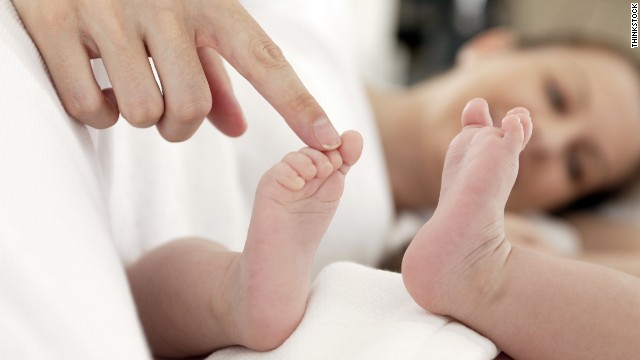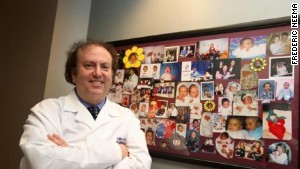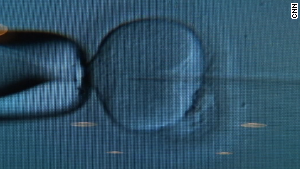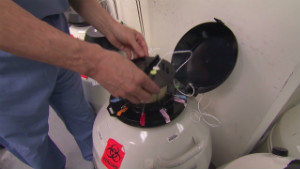5 questions on egg freezing
updated 8:08 AM EDT, Fri April 26, 2013

Technological advances including egg freezing are allowing women to have babies later in life.
STORY HIGHLIGHTS
- Women's eggs begin aging even before birth
- The best time to think about freezing eggs is in your 20s and 30s
- Healthy babies have been born from eggs frozen from five to nine years
Editor's note: Dr. Jeffrey Steinberg is a board-certified reproductive endocrinologist based in Los Angeles, New York and Guadalajara, Mexico. He is the director and founder of The Fertility Institutes.
(CNN) -- We all know about the importance of contraception in preventing unwanted pregnancy -- in 2013 more women are aware of their reproductive options than ever before.
While there have been great strides to make birth control and contraception common knowledge, women's options in terms of fertility are often not widely known. During National Infertility Awareness week, we have the unique opportunity to discuss reproductive aging, a topic that affects all women yet is rarely addressed.
As a woman, you are born with every single egg you will ever have for the rest of your life -- a fact most women should know and many find shocking. Unlike men, who are constantly able to produce new, viable sperm throughout their life, a woman's eggs begin to age even before birth and continue to do so until their final depletion at menopause.
This may seem like a terrifying concept for most women who plan on having children later, but it doesn't have to be. With egg freezing and the many new related technological advances in the field of reproductive medicine, women are now able to have children later in life. The key is not only knowing your options, but knowing them before it's too late.

Dr. Jeffrey Steinberg
Egg freezing is one of the easiest ways a women can radically slow down her biological clock, and it's something I recommend to all women concerned with their fertility. Here are some of the most common questions I am asked regarding egg freezing.
Q: How old should I be when I start thinking of freezing my eggs?
 IVF to help 'balance' families?
IVF to help 'balance' families?
 Freezing reproductive potential in time
Freezing reproductive potential in time
A: The best time to freeze your eggs is in your 20s and 30s. Younger eggs freeze better and have a better a chance of withstanding the freezing process -- ultimately providing you a greater chance of creating a baby.
The egg-freezing process is much simpler than many might think. Once the patient has been qualified as a candidate, we plan a cycle around her menstrual period. Soon after a menstrual period begins, we start administering fertility hormones. Patients take the fertility hormones in daily injections for up to two weeks. At the end of the two-week period, we extract the eggs, which is done with light sedation while the patient is asleep. The process is completed in 30 minutes or less. It is painless and quick -- and just like that, you've got yourself a great insurance policy against future infertility.
Q: Will I run out of eggs earlier if I freeze my eggs now?
A: This is a common misconception that could not be further from the truth. We're using eggs that you would have otherwise lost.
As human beings, we are designed to reproduce -- this is what nature wants us to do. So to make sure this happens, instead of choosing one egg per month to be "the" egg, nature chooses between 10 and 20 eggs. But, a woman is only able to produce enough fertility hormones to ovulate one of these eggs. So the others that weren't able to get that fertility hormone and make it to the "finish" line in time just die.
What we're doing is stepping into the equation and offering more fertility hormone to take advantage of those eggs that would have otherwise died off. So in actuality, we are saving your eggs.
Q: Does insurance pay for this?
A: In almost all instances, insurance does not yet cover egg freezing. Fertility preservation is seen as an elective procedure, much like plastic surgery or anti-aging medical procedures. However, if a woman is diagnosed with cancer or has to undergo surgery, radiation, chemotherapy or some sort of medical procedure that will render her infertile, we can usually get the insurance company to cover the process.
Q: How long are frozen eggs good for?
A: That's a question we don't really have an answer for simply because it is such a new science -- we haven't been freezing for all that long.
In the beginning, the odds were not very good at all, but the technology has been around for more than 10 years now and it has definitely enhanced. We now flash-freeze instead of slowly freezing eggs, which has improved the success rate tremendously. We have healthy babies from eggs frozen five to nine years, and babies from sperm that has been frozen for over 30 years. There is no reason to think that eggs would react any differently to the freezing process than sperm.
Q: Are babies created via in vitro fertilization (using frozen eggs) just as healthy as other babies?
A: Babies created via IVF, whether by frozen or fresh eggs, are just as healthy as babies born the old-fashioned way.
Occasional studies examining the very fine health details of IVF babies versus their non-IVF counterparts have shown that there may be a very slight increase in birth defects or subsequent health problems in IVF babies. When studying all problems, babies in the general population show a 6.6% risk of having a minor or major birth defect, versus 9% of the IVF babies.
What should also be taken into consideration is that many of these studies did not account for the fact that many couples undergoing IVF for infertility have other medical problems that may increase the chance for a problem in their resulting baby, or may be of advanced reproductive age and using older, more mature eggs.








